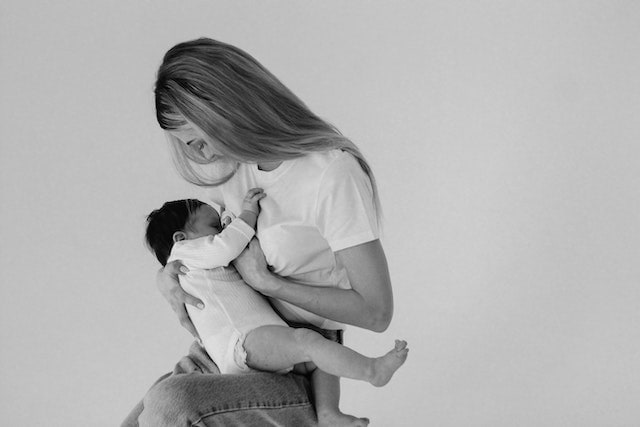Baby grunting while breastfeeding can be a common concern for new mothers. It can be alarming to hear your little one grunting and groaning during a feeding session.
However, it’s important to understand that this behavior is normal and can be caused by a variety of reasons.
Understanding Baby Grunting While Breastfeeding Grunting is a common behavior in babies, especially during their first few months of life.
During breastfeeding, babies may grunt due to the effort of sucking and swallowing, or when they need to pass gas or have a bowel movement. In some cases, grunting can be a sign of an underlying medical condition, such as reflux or colic.
Key Takeaways
- Baby grunting while breastfeeding is a common behavior that can be caused by a variety of reasons.
- Grunting can be a sign of an underlying medical condition, but it’s usually nothing to worry about.
- There are several breastfeeding techniques and home remedies that can help reduce grunting in babies.
Understanding Baby Grunting While Breastfeeding
Many new mothers may become concerned when they hear their baby making guttural noises or grunting sounds while breastfeeding. However, this is a common occurrence and is usually not a cause for alarm.
When a baby grunts while breastfeeding, it is often a sign that they are working hard to get the milk they need. The grunting can be a result of the baby’s efforts to latch onto the breast properly, suck effectively, and swallow the milk.
It is also possible that a baby may grunt while breastfeeding if they are experiencing discomfort or gas. In this case, it may be helpful to burp the baby or try different breastfeeding positions to alleviate any discomfort.
Overall, baby grunting while breastfeeding is a normal and common occurrence. As long as the baby is gaining weight and appears healthy, there is usually no cause for concern.
However, if a mother is ever worried about her baby’s grunting or any other aspect of breastfeeding, she should consult with a healthcare professional for guidance and support.
Common Reasons for Grunting
When a baby grunts while breastfeeding, it can be concerning for new parents. However, it is usually a normal part of the feeding process.
Here are some common reasons for grunting:
- Movement: Babies may grunt while feeding due to their natural movements. They may move their arms and legs or wiggle around while trying to get comfortable. This movement can cause them to make grunting noises.
- Gas: Babies can also grunt while feeding due to gas. If they swallow air while feeding, it can cause discomfort and lead to grunting. Burping your baby after feeding can help release any trapped gas.
- Reflux: Reflux is another common reason for grunting while breastfeeding. When the baby has reflux, stomach acid can come back up into the esophagus, causing discomfort and grunting noises. If you suspect your baby has reflux, talk to your pediatrician.
- Oversupply: If a mother has an oversupply of milk, it can cause the baby to gulp and swallow quickly, leading to grunting noises. Adjusting feeding positions or expressing some milk before feeding can help alleviate this issue.
- Milk flow: Similarly, a fast milk flow can also cause grunting. This is when the milk comes out too quickly for the baby to handle. Switching to a different feeding position or taking a break during feeding can help.
- Strain: If a baby is straining during feeding, it can also cause grunting. This may happen if they are constipated or trying to pass gas. It is important to monitor the baby’s bowel movements and talk to the pediatrician if there are any concerns.
- Latch: An improper latch can also cause grunting while breastfeeding. It can cause the baby to work harder to get milk, leading to grunting noises. Ensuring a proper latch can help alleviate this issue.
- Growth spurt: During a growth spurt, babies may feed more often and for longer periods of time. This can cause them to grunt due to exhaustion or frustration.
- Constipation: If a baby is constipated, it can cause grunting while feeding. It is important to monitor the baby’s bowel movements and talk to the pediatrician if there are any concerns.
- Overactive letdown: An overactive letdown can cause milk to come out too quickly, leading to grunting. Switching to a different feeding position or expressing some milk before feeding can help alleviate this issue.
- Hunger: Finally, if a baby is hungry, they may grunt in anticipation of feeding. It is important to feed the baby on demand to prevent hunger-related grunting.
Overall, grunting while breastfeeding is usually normal and nothing to worry about. However, if you have concerns or notice any other issues, it is important to talk to your pediatrician.
Signs and Symptoms of Grunting Baby Syndrome
Grunting Baby Syndrome is a common issue that some newborns experience while breastfeeding. It is characterized by the baby making grunting noises while feeding, which can be concerning for parents.
Here are some signs and symptoms to look out for:
- Grunting: A baby with Grunting Baby Syndrome will make grunting noises while feeding. These grunts can be soft or loud, and they may occur intermittently or throughout the entire feeding.
- Abdominal Muscles: The baby’s abdominal muscles may tense up or become rigid while grunting. This can indicate that the baby is having difficulty passing gas or stool.
- Pain: The baby may appear to be in pain while grunting. They may scrunch up their face, arch their back, or cry.
- Sleep: Grunting Baby Syndrome can also affect a baby’s sleep. They may have trouble falling asleep or staying asleep due to discomfort.
- Uncomfortable: The baby may appear uncomfortable while feeding. They may squirm or fuss, and they may pull away from the breast.
- Colic: Grunting Baby Syndrome can be a sign of colic, which is a common issue in newborns. Colic is characterized by excessive crying and fussiness, and it can be caused by a variety of factors.
While Grunting Baby Syndrome is usually not a cause for concern, it is important to rule out any underlying problems or illnesses. If your baby is experiencing other symptoms such as vomiting, lethargy, or pauses in breathing, it is important to seek medical attention.
Some common reasons for Grunting Baby Syndrome include:
- Constipation: If the baby is constipated, they may have difficulty passing gas or stool, which can lead to grunting.
- Acid Reflux: Acid reflux can cause discomfort and pain in babies, which can lead to grunting.
- Irritation: If the baby’s skin is irritated or they have a diaper rash, they may be uncomfortable while feeding, which can lead to grunting.
- Frustration: If the baby is having trouble latching onto the breast or getting enough milk, they may become frustrated and grunt.
- Nasal Flaring: If the baby is having difficulty breathing through their nose, they may grunt in an attempt to get more air.
In conclusion, Grunting Baby Syndrome is a common issue that some newborns experience while breastfeeding. While it is usually not a cause for concern, it is important to be aware of the signs and symptoms and to rule out any underlying problems or illnesses. If you are concerned about your baby’s grunting, speak to your pediatrician for guidance.
Breastfeeding Techniques to Reduce Grunting
Breastfeeding is a natural process that can sometimes be accompanied by grunting noises from the baby. While this is normal, it can be concerning for new mothers who may think that their baby is having difficulty breastfeeding.
Here are some breastfeeding techniques that can help reduce grunting while breastfeeding.
Proper Latching
One of the main reasons why babies grunt while breastfeeding is due to improper latching. A good latch ensures that the baby is getting enough milk and is not struggling to feed.
Mothers should ensure that their baby’s mouth is wide open and covers the entire nipple and areola. The baby’s lips should be flanged outwards, and the chin should be touching the breast.
Breast Compression
Breast compression is a technique that can help increase milk flow and reduce grunting. To perform breast compression, a mother should place her hand on her breast and compress it gently.
This will help the baby get more milk and reduce the need to grunt.
Nursing Positions
The position in which a mother nurses her baby can also affect how much the baby grunts. The cradle hold is a common nursing position, but it can cause the baby to have difficulty latching and lead to grunting.
The football hold or side-lying position may be more comfortable for the baby and reduce grunting.
Pumping
If a mother is unable to breastfeed, pumping can be an effective alternative. A breast pump can help stimulate milk production and provide milk for the baby.
Mothers should ensure that they use a high-quality breast pump and follow the manufacturer’s instructions.
Biting
Babies may sometimes bite while breastfeeding, which can cause discomfort and lead to grunting. Mothers can prevent biting by ensuring that the baby is latched correctly and gently removing the baby’s mouth if they bite.
In conclusion, grunting while breastfeeding is normal, but it can be reduced by following these breastfeeding techniques. Mothers should always consult with a healthcare professional if they have concerns about their baby’s feeding.
Role of Digestion in Baby Grunting
Digestion plays a significant role in baby grunting while breastfeeding. During the digestion process, the muscles in the digestive tract contract and relax to move food through the body. These contractions can cause discomfort and lead to grunting sounds.
When a baby is breastfeeding, they may take in air, which can cause gas to build up in their digestive tract. This can cause discomfort and lead to grunting sounds as the baby tries to pass the gas.
Additionally, bowel movements can also cause grunting sounds. As the baby’s body prepares to pass stool, the muscles in the anus and rectum may contract, causing the baby to grunt.
Anal stimulation during breastfeeding can also trigger these contractions, leading to grunting sounds.
Abdominal pressure can also contribute to baby grunting while breastfeeding. As the baby feeds, the pressure from the breast against their abdomen can cause discomfort and lead to grunting sounds.
Overall, digestion is a complex process that can contribute to baby grunting while breastfeeding. It is important to monitor your baby’s feeding habits and bowel movements to ensure they are comfortable and healthy.
Impact of Milk Supply on Baby Grunting
The milk supply of a breastfeeding mother can have a significant impact on the grunting behavior of her baby. An oversupply of milk can cause the baby to gulp and swallow excessively, leading to fussy nursing behavior and even weight loss.
It is important for mothers to be aware of their milk supply and to manage it appropriately. If a baby is experiencing fussy nursing behavior, it may be a sign of an oversupply of milk.
In this case, the mother can try expressing some milk before feeding or adjusting the baby’s position to slow down the flow of milk.
On the other hand, if a baby is not getting enough milk, they may also grunt while breastfeeding. This could be due to frustration from not getting enough milk or from having to work harder to get it.
In this case, the mother may need to increase her milk supply through more frequent feedings or pumping.
It is also important to note that bottle feeding can sometimes contribute to grunting behavior in babies.
The flow of milk from a bottle can be faster than from the breast, causing the baby to gulp and swallow more air. This can lead to discomfort and fussiness during and after feeding.
In order to ensure that a baby is getting the right balance of foremilk and hindmilk, mothers should make sure to feed on both sides and allow the baby to finish one breast before switching to the other.
This can help prevent the baby from only getting the foremilk, which can lead to a blue tongue and other issues.
Overall, it is important for mothers to be aware of their milk supply and to manage it appropriately in order to prevent grunting behavior and ensure that their baby is getting the nutrition they need.
Also read: When Can Babies Burp Themselves
When to Seek Medical Help
While grunting during breastfeeding is usually normal, there are some cases where it may indicate a more serious medical condition. Parents should seek medical attention if their baby exhibits any of the following symptoms:
- Sepsis: If the baby has a fever, lethargy, poor feeding, and breathing difficulties, it may indicate sepsis, which is a life-threatening condition that requires immediate medical attention.
- Meningitis: Grunting, along with fever, irritability, and poor feeding, may indicate meningitis, which is a serious infection that affects the brain and spinal cord.
- Heart Failure: In rare cases, grunting may be a sign of heart failure, which can cause difficulty breathing, poor feeding, and fatigue.
- Respiratory Distress: If the baby is grunting, has difficulty breathing, and is using their chest muscles to breathe, it may indicate respiratory distress, which can be caused by a variety of conditions, including asthma, pneumonia, and trapped mucus.
If a baby exhibits any of these symptoms, parents should seek medical help immediately. It is important to note that while grunting is usually normal, it can sometimes be a sign of a more serious underlying condition.
Home Remedies and Strategies for Grunting
There are several home remedies and strategies that can be used to help reduce grunting in breastfed babies. Here are some of the most effective solutions:
Burping
Burping is one of the most common ways to help reduce grunting in babies. This is because it helps to release any trapped air in the baby’s stomach, which can cause discomfort and lead to grunting.
To burp a baby, hold them upright against your chest and gently pat or rub their back until they release any air.
Teething
Teething can also cause grunting in babies. To help relieve the discomfort, parents can give their baby a cold teething ring to chew on or gently massage their gums with a clean finger.
Diarrhea
If a baby is experiencing diarrhea, it can also lead to grunting. To help reduce the symptoms, parents can make sure the baby is getting plenty of fluids and offer them foods that are easy to digest, such as bananas, rice, and applesauce.
Breastfed Babies
Breastfed babies can sometimes grunt while feeding due to the flow of milk. To help reduce this, parents can try different feeding positions, such as the football hold or side-lying position.
They can also try to slow down the flow of milk by taking breaks during feeding or switching breasts more frequently.
Overall, there are several effective home remedies and strategies that can be used to help reduce grunting in babies. By trying these solutions, parents can help their baby feel more comfortable and relaxed.
Related Posts:
- Baby Boy Peeing Out Back Of Diaper
- Can You Breastfeed While the Baby Is Swaddled?
- Mold In Breast Pump Tubing
Frequently Asked Questions
What causes a baby to grunt while breastfeeding?
Babies may grunt while breastfeeding due to various reasons, including gas, constipation, acid reflux, and an immature digestive system. Some babies may also grunt due to the effort of coordinating their sucking, swallowing, and breathing.
How can I help my baby stop grunting while breastfeeding?
You can try burping your baby frequently during and after feedings to relieve gas. You can also try different breastfeeding positions to help your baby breathe more easily.
If your baby has acid reflux, your doctor may recommend medication or other treatments.
Is it normal for a baby to vocalize while nursing?
Yes, it is normal for babies to make vocalizations while nursing. Some babies may coo, grunt, or make other noises while breastfeeding as a way to communicate with their mother or express their satisfaction.
What are some tips for preventing gulping while breastfeeding?
To prevent gulping while breastfeeding, you can try positioning your baby upright and keeping them calm during feedings. You can also try slowing down the flow of milk by adjusting your position or using a nipple shield.
Why does my baby click while breastfeeding and how can I prevent it?
Babies may click while breastfeeding due to a poor latch or an overactive letdown reflex. To prevent clicking, you can try adjusting your baby’s position, ensuring a proper latch, and using breast compression techniques to control the flow of milk.
Why does my baby make groaning noises while breastfeeding?
Babies may make groaning noises while breastfeeding due to the effort of coordinating their sucking, swallowing, and breathing. This is normal and usually nothing to worry about.
However, if you are concerned, you can talk to your doctor or a lactation consultant for further advice.

Iesha is a loving mother of 2 beautiful children. She’s an active parent who enjoys indoor and outdoor adventures with her family. Her mission is to share practical and realistic parenting advice to help the parenting community becoming stronger.



